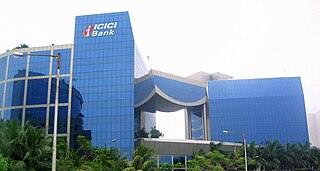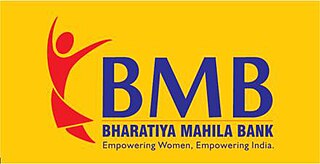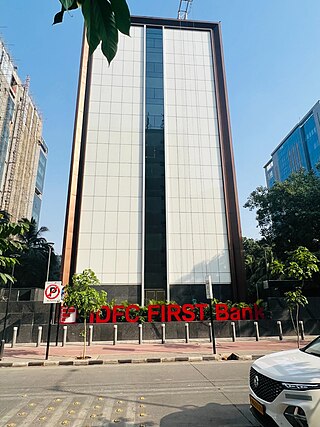Related Research Articles

Bank of Baroda is an Indian government Public sector bank headquartered in Vadodara, Gujarat. It is the second largest public sector bank in India after State Bank of India. Based on 2023 data, it is ranked 586 on the Forbes Global 2000 list.
Punjab & Sind Bank is an Indian public sector bank headquartered in New Delhi. As of 18 April 2023, the bank has 1553 branches which are widely spread across India out of which 635 branches are in the state of Punjab, and 25 zonal offices located all over India.

ICICI Bank Limited is an Indian multinational bank and financial services company headquartered in Mumbai with a registered office in Vadodara. It offers a wide range of banking and financial services for corporate and retail customers through various delivery channels and specialized subsidiaries in the areas of investment banking, life, non-life insurance, venture capital and asset management.
UCO Bank, formerly United Commercial Bank, is an Indian public sector bank, and financial services statutory body headquartered in Kolkata. UCO Bank is the 10th largest public sector bank in India by total asset and ranked 1948 in Forbes Global 2000 list of year 2018 & ranked 80 on the Fortune India 500 list in 2020. During FY 2023–24, its total business was ₹4.50 lakh crore. The market capitalisation of bank is ₹71,078 crore (2024).

Modern banking in India originated in the mid of 18th century. Among the first banks were the Bank of Hindustan, which was established in 1770 and liquidated in 1829–32; and the General Bank of India, established in 1786 but failed in 1791.
Kotak Mahindra Bank Limited is an Indian banking and financial services company headquartered in Mumbai. It offers banking products and financial services for corporate and retail customers in the areas of personal finance, investment banking, life insurance, and wealth management. As of December 2023, the bank has 1,869 branches and 3,239 ATMs, including branches in GIFT City and DIFC (Dubai).

Cooperative banking is retail and commercial banking organized on a cooperative basis. Cooperative banking institutions take deposits and lend money in most parts of the world.

The National Bank for Agriculture and Rural Development (NABARD) is an All India Financial Institution (AIFI) and an apex Supervisory Body for overall supervision of Regional Rural Banks, State Cooperative Banks and District Central Cooperative Banks in India. It was established under the NABARD Act 1981 passed by the Parliament of India. It is fully owned by Government of India and functions under the Department of Financial Services (DFS) under the Ministry of Finance.
Pratibha Mahila Sahakari Bank was a cooperative bank based in Jalgaon, Maharashtra, India. It was founded in 1973 by Pratibha Patil, who later became President of India, with the objective of empowering women.

The economy of Gujarat, a state in Western India, is the most industrialised in India, having the highest industrial output of any state in the union. It has the highest exports of any Indian state, accounting for 33% of all Indian exports in 2022-23. It leads in diverse industrial sectors such as chemicals, petrochemicals, dairy, drugs and pharmaceuticals, cement and ceramics, gems and jewellery, textiles and engineering. It has the highest Electricity Production Capacity and Maritime Port Cargo Volume among all states in India. It also has significant agricultural production with major agricultural produce of the state being cotton, groundnuts (peanuts), dates, sugar cane, milk and milk products. Gujarat recorded the lowest unemployment rate in India in 2022, with 4.4% of the labour force being unemployed.

Regional Rural Banks (RRBs) are government owned scheduled commercial banks of India that operate at regional level in different states of India. These banks are under the ownership of Ministry of Finance, Government of India, Sponsered Bank and concerned State Government in the ratio of 50:35:15 respectively. They were created to serve rural areas with basic banking and financial services. However, RRBs also have urban branches.

Saraswat Co-operative Bank Ltd. is an urban co-operative banking institution, having its headquarters in Mumbai, Maharashtra, India and operating as a co-operative society since 1918. The Founding Members of the society were J.K. Parulkar as chairman, N.B. Thakur as vice-chairman, P.N. Warde as Secretary, and Shivram Gopal Rajadhyaksha as Treasurer.
Abhyudaya Co-operative Bank Ltd is an urban multi-state Cooperative banking institution based in Maharashtra, India and operating as a co-operative bank since 1965.

Bharatiya Mahila Bank was a fully owned subsidiary of State Bank of India based in Mumbai, India. Former Indian Prime Minister Manmohan Singh inaugurated the system on 19 November 2013 on the occasion of the 96th birth anniversary of former Indian Prime Minister Indira Gandhi. As part of the Modi government's banking reforms and to ensure greater banking outreach to women, the bank merged with State Bank of India on 1 April 2017.
Madhavpura Mercantile Cooperative Bank (MMCB) was a Gujarat-based interstate cooperative bank that became defunct and lost its licence after it was unable to pay back the money it owed public depositors. Reserve Bank of India cancelled its licence in June 2012 under section 22 of the Banking regulations Act, 1949.
The Tamil Nadu State Apex Co-operative Bank, also known as TNSC Bank, is an Indian cooperative banking company headquartered in Chennai. It was incorporated in 1905 as an urban cooperative bank. As of 2015, TNSC Bank had 46 branches in Chennai. TNSC Bank coordinates India's entire short-term cooperative credit structure.
Suvarna Sahakari Bank was an Indian private urban co-operative bank based in Pune, Maharashtra, India, which operated from its incorporation on 22 September 1969 till its dissolution on 20 May 2009.

IDFC FIRST Bank is an Indian private sector bank formed by the merger of the banking arm of Infrastructure Development Finance Company and Capital First, an Indian non-bank financial institution.
Punjab & Maharashtra Co-operative Bank Limited (PMC), is a multi-state co-operative bank that began operations in 1983. It has 137 branches spread over half a dozen states of India and nearly 100 branches are in Maharashtra. It is regulated by the Reserve Bank of India and registered under the Cooperative Societies Act.
References
- ↑ Genesis and Architecture of Urban Cooperative Banks Reserve Bank of India, 7 December 1999 Archived 27 September 2007 at the Wayback Machine
- 1 2 3 "New Asia's oldest co-op bank starts recovery drive". The Times of India. 26 June 2003. ISSN 0971-8257 . Retrieved 11 June 2024.
- 1 2 3 "Anyonya Co-op Bank on revival path". The Indian Express . Vadodara. Express News Service. 8 September 2008.
- ↑ "Anyonya Co-op Bank goes bust". The Indian Express . Vadodara. Express News Service. 16 September 2007.
- ↑ "Anyona Co-op Bank assets under hammer". Indian Cooperative. 17 November 2013.
- ↑ "Liquidation of Anyonya bank's movable assets begins". Times of India. 13 November 2013.
- ↑ "PNB manager, three others held for siphoning Rs 1.7 crore Anyonya bank FD". Times of India. 21 July 2020.